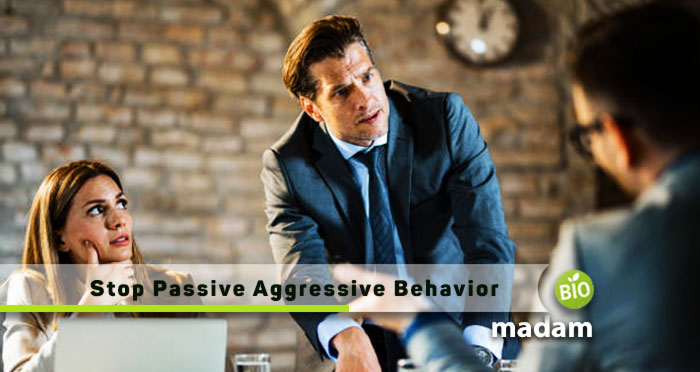Does your friend often tell you that everyone likes you because you are dual-faced? It might not be true. It is their way of expressing their anger, using a less aggressive approach.
While you may not see it apparently, passive-aggressive behavior is quite common around us. Many people express their dislike and anger indirectly – known as passive-aggressiveness.
Passive-aggressive behavior in workplaces is also quite common. If you think you have also become like those friends and exhibiting passive-aggressive behavior, you must stop it. It does not only harm the other person but you too.
What is Passive Aggressive Behavior?
American Psychological Association defines passive-aggressiveness as:
“Characteristic of behavior that is seemingly innocuous, accidental, or neutral but that indirectly displays an unconscious aggressive motive. For example, a person who constantly keeps people waiting and then is baffled at why they resent this behavior is passive-aggressively disavowing an unconscious wish to be special and to provoke those who fail to acknowledge the specialness.”
Characteristics of a Passive-Aggressive Person
How to determine if you have passive aggressiveness? Self-analysis can be quite difficult to rule out a problem. However, these few characteristics can help you understand if you are a passive-aggressive person.
Different Body Language
Do you often say something sarcastically when you cannot say it directly? It is usually due to a lack of confidence and the control you faced in your early life. You will see a change in body language when you are around people you dislike. Passive-aggressive people may say something while their body language depicts otherwise.
For example, you may say “Nothing” when someone asks you, “What’s wrong?” Yet, you do not talk to them properly and believe they should know what’s wrong.
The Silent Treatment

Another common trait of a passive-aggressive person is giving the silent treatment. Passive-aggressive people do not express they are upset about something. Instead, they just stop talking to that person. It enables them to express their anger without communication or confrontation. However, those in a relationship should find ways to improve their communication with their partner in order to avoid future disputes.
Procrastination
When passive-aggressive people find it difficult to communicate, they keep delaying the task. They do not prefer talking to the other person and finding a solution to the problem. Alternatively, as a passive-aggressive person, you try not to express and escape the situation somehow.
Sighing and Huffing
Body language is an essential determinant of passive-aggressive behavior. Passive-aggressive people do not like conversing and communicating their concerns. On the other hand, they will try to keep the conversation short and fill it with different gestures. Sighing and huffing are some non-verbal communication features that help them get out of a conversation more quicker.
Manipulating Situations
Passive-aggressive people sometimes manipulate situations to their benefit as they do not talk directly. Such behavior may lead to disappointment in the workplace. Your colleagues will dislike you when they know that you have been twisting matters.
How to Stop Passive Aggressive Behavior
Self-Analysis
Self-analysis is one of the most crucial elements in stopping passive-aggressive behavior. Passive-aggressive behavior often builds in us, and we do not realize it until it is serious. You might get bitter and more passive-aggressive every day without realizing it. If you experience any signs of passive-aggressive behavior, do not let it go. Pay attention to how you treat people and how they respond. People who understand your passive aggression might often talk less and stay away. Or a good friend might speak to you and try to understand your behavior. It is crucial to catch these signs of passive aggression.
Find the Root Cause
The next step is to find the root cause. Experts suggest that many people adopt this kind of behavior because of their early experiences. It could be due to excessive control by your parents, your shy nature, or some sort of depression. All of it can lead to passive aggression unintentionally. Finding the root cause can help you realize how much help you need. But, working on your behavior is more critical.
Remember that you can Improve
Many people do not make an effort to stop their passive-aggressive behavior. They believe they are made this way and nothing can be done now. However, this will not help and only halt you from becoming a better person. Always remember that the past is gone. Learn from your previous behavior and see how you can become a better person. We are also adding a few here for you.
Be Confident
Feeling bad or being upset is a natural human emotion, and you should never feel bad about it. Be confident about what you feel. But, instead of giving away passive-aggressive energy, communicate with the concerned person. Tell them they did something that did not feel right to you – but in a nice way.

Practice Assertion
One of the best tricks for “how to stop passive-aggressive behavior” is being assertive. When you are assertive about your decisions and point of view, you will not have to manipulate situations to your benefit. Practicing assertion will also pave your path to becoming a leader. It enables you to put forward your emotion and ideas without being passive-aggressive.
Journal
The journey to being assertive and communicative instead of aggressive is not easy. It requires you to find an alternate way to channel your aggression. Maintaining a journal is one of the most effective tried and tested methods to eliminate negative energy without impacting the people around you. Pen down what you feel and throw it away. It will let you get rid of passive aggressiveness without directing it to anyone.
Believe in Yourself
You cannot take this behavior out of your life until you believe in yourself. Self-belief will empower you to communicate and confront instead of manipulating. It will enable you to talk confidently without the fear of being rejected.
The Bottom Line
Passive aggression is like a parasite that invades a host cell and ultimately kills you inside and detaches people from you. Stopping passive-aggressive behavior is not a one-day task. Yet, believe in yourself to let go of the negativity and instill positive energy. Journaling also helps channel passive aggression instead of directing it to people. The key is to communicate and be confident about your emotions.

Anna has completed her degree in Pharmacy from the University of Hawaii. She is serving as a research assistant in a pharmaceutical company. She had a great interest in writing blogs, traveling to different parts of the US, and trying delicious recipes in her spare time.

